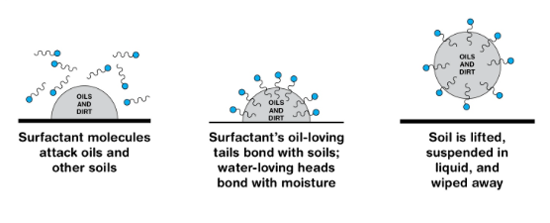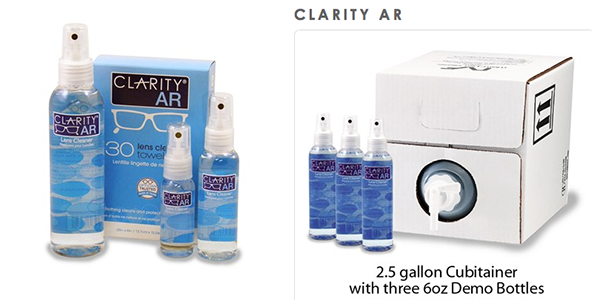We all know that awful feeling. When your new car gets its first door ding. When your new armchair gains chocolate-y fingerprints. When your smartphone screen gets scratched on your pocket change. When those new ultra-hip boots get rain-stained.
We want to protect the things we love – especially the pricy ones. What, after all, are automobile top coats, Scotchgarding, cell phone covers, and mink oil if not ways of keeping our favorite things in like-new perfection? Our things are an extension of ourselves—either manifestations of who we are or what we do. We want them to be preserved; we want them to persevere.
Doesn’t that love – and desire for protection – extend to eyewear? As eyecare professionals, we know it does. The smile on a customer’s face when she’s found the perfect pair says it all.
Lens care preserves eyewear – and customer smiles.
Nanofilm understands the way customers feel about their new glasses – and the disappointment that damage can cause.
For the past thirty years, Nanofilm has been one of, if not the major player in the lens care field, carefully developing a place for itself as the premier provider of a lens solution. They’ve invested in a staff of high-level chemists performing ongoing R&D to formulate lens care that’s not only meant to clean but to preserve and protect eyeglass lenses and coatings. Why the crusade? A simple truth: the conventional tried-and-true means aren’t always necessarily so true after all. In fact, they often leave lenses hazy or dirty and can actually damage lenses and coatings.
Dish soaps, household cleaners, hand soaps or window cleaners? A bad idea, when you look at the science. Says Dr. Stephanie Castro, Ph.D., manager of R&D for Nanofilm, soap can be anything. Dish soaps and other household cleaners can have a very high pH, making them harsh and caustic. The powerful ingredients in these cleaners are designed to remove soap scum and food particles and can contain very aggressive chemicals, which can actually harm the anti-reflective (AR) coating on the lens.
What about hand soap? The one in your bathroom, which can contain moisturizers, means you’re going to have greasy residue all over your glasses. The ones in the kitchen, laundry room or workshop may contain grease removers, chemical fortifiers or even cleansing beads. Ouch!
Window cleaners can contain ammonia which can also damage the AR coating. So ‘soap and water’ is a very broad [term]… the stuff in soap and water can actually damage your glasses.
In an effort to increase the efficiency of the lens cleaning process, Nanofilm has undertaken years of extensive research on exactly how various types of cleaning products interact with not just the chemical, molecular structure of eyeglass lenses, but the sort of dirt and debris most likely found on the average wearer’s lens. Says Castro, “Generally speaking, we avoid the very aggressive detergents designed to tackle household and industrial soils, which are less likely to contaminate people’s glasses. We formulate a solution that’s going to emulsify and lift the soils most commonly found on glasses... sebum, the oil on people’s fingers, cosmetic and hair care product residue, and generic household dust.

Our cleaners are all pH neutral, very close to water. Our cleaners are both effective and non-aggressive. They’re formulated, rigorously tested and proven not to damage any coatings.”
AR lenses: the case for TLC protection
The clearest example of the need for proper protective care is AR coatings. They are just nanometers thick – 1/10,000 the thickness of a human hair. Says Nanofilm’s Dr. Castro, "They’re delicate, and once they’re scratched, you can really see the scratches. You want to do everything you can to avoid scratching those coatings.”

The end result of this work is Nanofilm’s Clarity AR lens cleaning solution, tailor-made to purge lenses of dirt while also acting to prevent damage to AR treatments and the lenses themselves. The solution acts like a magnet for the most common soils found on eyeglass lenses. Clarity AR is also specifically formulated to work with the hydrophobic treatments found on most of today’s quality anti-glare treatments. The coating is “slick”, so ordinary cleaners tend to bead up and roll away before they can clean the lens. Clarity AR is different. It spreads over the lens and grips any lens contaminants, lifting them off the lens surface so that they can be cleanly wiped away with a microfiber cloth. The result is a lens cleaning process that gives the wearer crystal clear vision with the security of a cleaner that will not damage the lenses.

Lens Care Protects and Preserves Your Business, too.
Eyeglass lenses aren’t the only tangible investment Nanofilm is interested in protecting. They’re also interested in your business. Worried about your brick-and-mortar’s place in the world in the face of the behemoth that is online optical?
Says Rex Talbott, Business Director of Optical Products for Nanofilm, “Opticians who don’t discuss lens cleaning product or simply give it away are missing an opportunity: the opportunity to help reassure their customers that they are caring for their lenses properly to protect and enjoy them, and the opportunity to increase the dollar value of each transaction. Lens care products can add $5-$20 to each purchase of glasses—bumping the total dollar ring up to 5% or 10%, depending on the price of the glasses.
To illustrate the potential of lens cleaners as a business, consider this: 64% of adults wear glasses. That is 156 million people. If just 5% of those people started to buy lens cleaner with their purchase, that would result in 7.8 million additional lens care products sold in the U.S. If lens cleaners sold for $10 each, that is $78 million category. “And all opticians have to do is add a 30-second conversation about proper lens care as part of the sale of a new pair of glasses,” notes Talbott. Lens care products can be a profit center.
We’re rarely given the opportunity to truly make things last. Why not, then, take that opportunity when it comes along?
With Nanofilm, your lenses—your patient’s lenses—can stand the test of time. Why not let them?
Article by Nanofilm, a sponsor of the Optician’s Handbook. For more information visit www.nanofilmusa.com

Rex Talbott is Director-Optical for Nanofilm, which has been a leader in the lens coatings and lens cleaning products for 30 years. He has a depth of experience in consumer personal care product marketing.










